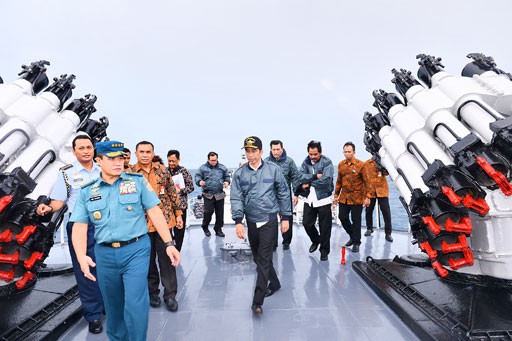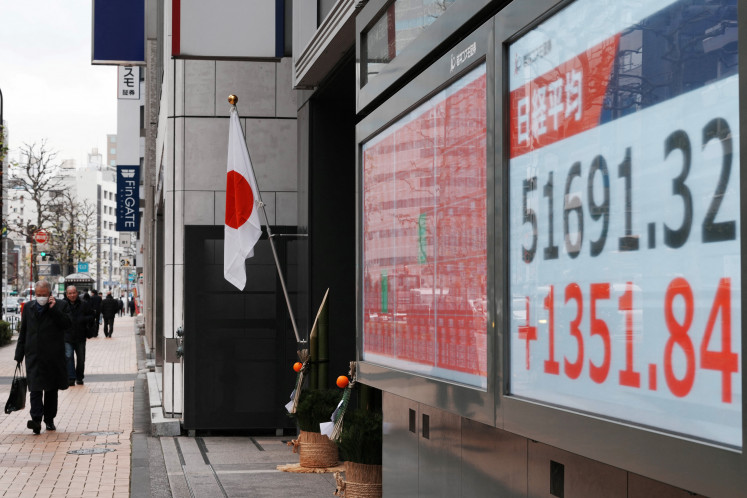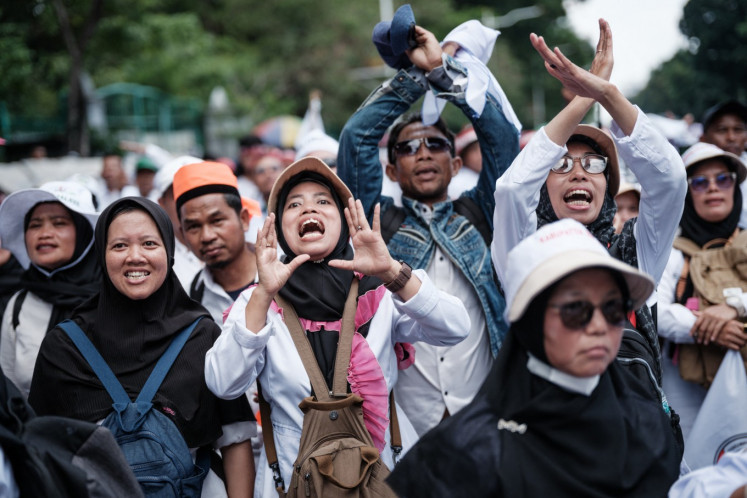Popular Reads
Top Results
Can't find what you're looking for?
View all search resultsPopular Reads
Top Results
Can't find what you're looking for?
View all search resultsIndonesia is a Pan Indo-Pacific super power
The "ASEAN Outlook on Indo-Pacific," as agreed by the ASEAN Leaders Summing in Bangkok in July 2019 was important but insufficient to showcase Indonesia's maritime prowess beyond ASEAN centrality.
Change text size
Gift Premium Articles
to Anyone
 On the frontline: President Joko “Jokowi” Widodo (center), accompanied by Navy chief of staff Adm. Ade Supandi (left) and other senior officials, inspects the warship KRI Imam Bonjol 383 after a Cabinet meeting onboard in the Natuna waters, Riau Islands, on Thursday. Of late, Chinese fishing vessels have several times encroached into Indonesia’s Natuna waters to catch fish illegally. (Courtesy Setpres/Krishadiyanto)
On the frontline: President Joko “Jokowi” Widodo (center), accompanied by Navy chief of staff Adm. Ade Supandi (left) and other senior officials, inspects the warship KRI Imam Bonjol 383 after a Cabinet meeting onboard in the Natuna waters, Riau Islands, on Thursday. Of late, Chinese fishing vessels have several times encroached into Indonesia’s Natuna waters to catch fish illegally. (Courtesy Setpres/Krishadiyanto)
I
ndonesia is a maritime super power. It is time to acknowledge it beyond the notion of Indonesia as a “global maritime fulcrum”. To begin, Indonesia is sixth in terms of the size and scale of its exclusive economic zone (EEZ). Ahead of Indonesia are respectively France; United States; Australia; Russia; and United Kingdom.
Regardless of who will be the top dog in the post COVID-19 world order, be it the US or Group of 7, or, perhaps China in combination with Russia, Indonesia's EEZ's numerical superiority and advantages will forever remain unchallenged.
The key is to understand deep-sea drilling as the EEZ extends out to 200 nautical kilometers; create a strictly well managed Indonesian sovereign wealth fund that can protect the revenues drawn from the EEZ, which Indonesia seems to be doing with the help of Japan Bank of International Cooperation (JBIC) and International Private Investment Cooperation (IPIC); the latter a private arm of the US State Department.
Should Indonesia have any doubts about learning from the best-case practice, especially on how to protect the resources and revenue of the EEZ, Coordinating Maritime Affairs and Investment Minister Luhut Pandjaitan, with the blessing of President Joko Widodo and the Cabinet, should immediately strike up a strategic relationship with Norway or the Norwegian Sovereign Fund.
Why with Norway first?
This is because Indonesia is an archipelagic state, with some 18,000 islands. With many of them still underdeveloped. Yet, the challenging geography of Norway, which was a sleepy hollow from the 1950s until the 1960s, did nothing to stop Oslo from becoming a formidable power.
Once Norway discovered oil on Aug. 1, 1969 in the North Sea, there was no turning back. It was all about non-corruption, and sound management of these incoming revenues, and reinvesting the oil bonanza in strategic portfolios and stocks professional and globally. Norway did not leave out its investment on barge and oil tankers, often by working hand-in-hand, with Denmark, its Scandinavian neighbor.
Invariably, even in spite of the impact of COVID-19, the Norwegian Sovereign Fund alone has become the largest in the world, valued at almost US$1.24 trillion. If one looks at the top 10 countries with their respective EEZ, Indonesia can be friendly with the first five, and Jakarta can also have joint partnership (JV) with the next 17 countries with the varying sizes of EEZ, including Norway at rank 17, the spectrum of collaboration on EEZ is endless for Indonesia, whether Europe, Asia, the Pacific.
Within Indo-Pacific, Indonesia can work with countries that already have an Indo-Pacific strategy, such as the US, Japan, Australia, India, the UK; with the Philippines being the only member state of ASEAN that has a large EEZ, which puts it at number 21.
The fact is Indonesia is entitled to a Pan Indo-Pacific strategy to work with more countries with large EEZ. The "ASEAN Outlook on Indo-Pacific," as agreed by the ASEAN Leaders Summing in Bangkok in July 2019 was important but insufficient to showcase Indonesia's maritime prowess beyond ASEAN centrality, or, Indo-Pacific strategy.
Moreover, it is estimated in a maritime study that the total value of all the oceans in the world are worth more than $30 trillion; 30 times the gross domestic product of Indonesia currently. Of this gross number, only $1.3 trillion of the oceanic value has been tapped over the last century.
But Jakarta must be more ambitious. Why? Aside from working with all the top five countries in terms of potential JV in Indonesian EEZ, where France has 93 percent of its EEZ in the Indian Ocean and the Pacific, Indonesia can also form various JVs with others lower in the league nearer to Indonesia too. For example, working with France poses one difficulty for Indonesia.
France needs to prove it is a worthy Indo-Pacific power first by showing its ability to cruise along critical sea lanes; beyond demonstrating its sizable EEZ.
Second, Indonesia is one of the three littoral states that control the Straits of Malacca, with Malaysia and Singapore as the other two. France, as a newcomer, has to work with all, especially Indonesia. Jakarta does not need to wait for anyone.
Third, with Indonesia owning Natuna Island, which is strategically located in the North Natuna Sea, staring straight at the South China Sea, almost touching one of China's nine dash lines, the China-Indonesia tie is squared; based on mutual respect.
Indeed, should Indonesia need more JV partners with a large EEZ that is experienced with deep sea fisheries, number 7, which is Canada can help, while number 8 is Japan won't resist too.
Last, Mexico and Chile, are members of the Asia Pacific Economic Cooperation (APEC), in which Indonesia belongs to as well. Mexico, Chile, and Indonesia can work collaborate on their EEZ as Pan-Indo-powers. Therefore, Indonesia must get its Pan Indo-Pacific grand strategy in place.
With the Pan Indo-Pacific grand strategy, Indonesia can assist the development of neighboring Papua New Guinea, Solomon Islands and Timor Leste, Kiribati and Micronesia Federated States, all of which have huge EEZ, too.
***
The writer is founder CEO of Strategic Pan Indo-Pacific Arena (Strategicpipa.com).









